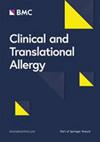Association of ZNF608 Polymorphisms With House Dust Mite-Induced Allergic Rhinitis
Abstract
Background
Genetic factors contribute essentially to the pathophysiology of house dust mite (HDM)-induced allergic rhinitis. Previous studies mainly focused on the biological pathogenesis, but the heritability remains poorly explained.
Methods
A genome-wide gene association analysis (GWGAS) integrating joint-genetic variant effects at the gene level was initially conducted on allergic rhinitis, validated by differential gene expression analysis. A weighted polygenic risk score (wPRS) was used to proxy the cumulative effect of candidate genetic variants in key genes. Gene-set analysis and eQTL analysis were performed to explore the immunologic pathway and genetic regulation of the key gene.
Results
ZNF608 was identified as the key gene involving HDM-induced allergic rhinitis risk (p = 1.23 × 10−6), which was highly expressed in nasal epithelium cells of allergic rhinitis patients (p = 0.041). Furthermore, a wPRS of five significant variants, rs6862252, rs10067299, rs10042766, rs6866116, and rs79679768 in the ZNF608, showed the cumulative effect was associated with the increased HDM-induced allergic rhinitis risk (odds ratio [OR] = 1.40, 95% confidence interval [CI] = 1.18–1.65, p = 1.18 × 10−4), with varied effects under diverse conditions of nasal symptoms. Additionally, both rs6862252 G allele and rs10042766 T allele elevated the expression of ZNF608 involving in state and perturbation of immune cells, such as B cell, T cell, and dendritic cell, contributing to HDM-induced allergic rhinitis.
Conclusion
This study highlights the key gene ZNF608 of HDM-induced allergic rhinitis, which may lay the groundwork for risk assessment and early diagnosis of allergic rhinitis.


 求助内容:
求助内容: 应助结果提醒方式:
应助结果提醒方式:


